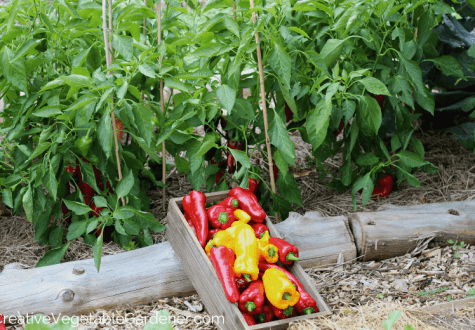Best Fertilizers for Peppers: Attain Superior Results in Your Garden
Best Fertilizers for Peppers: Attain Superior Results in Your Garden
Blog Article
Just How Plant Foods Play a Crucial Duty in Cultivating Abundant and healthy Pepper Crops
Fertilizers work as the foundation of effective pepper farming, offering a tactical approach to nourishing the soil and cultivating ideal plant development. The elaborate dancing between necessary nutrients and the pepper plants' physiological procedures highlights the pivotal role that fertilizers play in ensuring a bountiful harvest. From sustaining robust root development to strengthening disease resistance, the effect of fertilizers is significant in the farming of worthwhile and healthy and balanced pepper plants. Stay tuned to uncover the nuanced ways in which plant foods add to the thriving of pepper plants and the lasting techniques that underpin their efficiency.
Significance of Nutrient-Rich Fertilizers
The use of nutrient-rich fertilizers plays a crucial function in boosting the performance and quality of pepper plants in contemporary agricultural practices. Pepper plants require a balanced mix of necessary nutrients to flourish and generate high returns of quality fruits. Nitrogen, phosphorus, and potassium are primary nutrients that are essential for the growth and growth of pepper plants. Nitrogen help in leafed environment-friendly growth and total plant vitality, phosphorus supports root growth and flower production, while potassium adds to illness resistance and fruit high quality.
Inadequate degrees of these nutrients can lead to stunted growth, reduced returns, and susceptibility to illness (best fertilizers for peppers). Nutrient-rich plant foods supply a targeted remedy to make sure that pepper plants obtain the needed aspects for optimum growth and efficiency. In addition, these fertilizers assist boost dirt fertility in time, producing a lasting setting for long-lasting pepper growing
Enhancing Plant Development and Development
To maximize plant growth and growth in pepper plants, calculated application of nutrient-rich plant foods is important. Plant foods play a critical function in boosting the general wellness and performance of pepper plants by offering them with important nutrients that may be lacking in the dirt.
In enhancement to these macronutrients, trace elements such as iron, zinc, and magnesium are also vital for the appropriate performance of different plant procedures. Iron, for circumstances, is needed for chlorophyll manufacturing, which is important for photosynthesis and overall plant growth. Zinc plays a critical duty in enzyme task and hormone synthesis, impacting plant development and advancement at a mobile degree. Magnesium is essential for the development of chlorophyll and overall energy transfer within the plant.

Boosting Disease Resistance With Fertilizers
By purposefully including targeted fertilizers, farmers can boost the condition resistance of pepper plants, ensuring optimum plant health and productivity. Plant foods including necessary nutrients like nitrogen, potassium, and phosphorus play a vital duty in reinforcing pepper plants' immune systems, making them more durable to various diseases.

Maximizing Pepper Return Via Fertilizing
Utilizing a well balanced fertilization method is key to achieving optimum pepper return and making certain ideal plant efficiency. By giving peppers with the ideal nutrients at the correct time, farmers can substantially improve their yield capacity. Nitrogen, potassium, and phosphorus are important aspects for pepper growth, with nitrogen helping in fallen leave and stem growth, phosphorus supporting origin growth and blossom development, and potassium promoting general plant health.
To make best use of pepper yield, it is vital to carry out soil examinations to establish existing vitamins and mineral degrees and identify any deficiencies that need to be resolved. Based on these results, farmers can create a tailored fertilizing plan that meets the specific requirements of their pepper crops. In addition, correct fertilizing strategies such as split applications throughout the expanding period can guarantee constant nutrient availability for the plants.

Sustainable Fertilizer Practices for Peppers
In thinking about lasting plant food techniques for peppers, it is essential to concentrate on long-term dirt health and wellness and ecological stewardship in conjunction with making the most of crop productivity. Sustainable fertilizer techniques aim to keep or enhance dirt fertility while minimizing damaging original site ecological effects. One essential strategy is making use of organic fertilizers such as garden compost, manure, or cover plants, which not just offer vital read here nutrients to the peppers yet additionally add to dirt framework and microbial task. These organic options assist develop raw material in the soil, improving its ability to preserve water and nutrients, thus sustaining lasting plant health and durability.
Furthermore, accuracy agriculture methods, such as soil testing and targeted nutrient applications, can help maximize fertilizer use, making certain that peppers receive the nutrients they need without excess overflow into rivers. This not just benefits the environment by reducing air pollution yet likewise saves prices for farmers by decreasing waste. By taking on sustainable fertilizer methods, pepper farmers can safeguard the health and wellness of their crops, dirt, and surrounding environments for future generations.
Conclusion
In final thought, plant foods are vital for growing plentiful and healthy pepper plants. best fertilizers for peppers. They offer required nutrients for plant development and growth, increase disease resistance, and make the most of return. By executing sustainable plant food techniques, farmers can ensure the long-term wellness of their pepper crops and add to an extra efficient and environmentally-friendly agricultural system
The detailed dancing in between important nutrients and the pepper plants' physiological processes highlights the essential function that fertilizers play in ensuring an abundant harvest.To maximize plant development and advancement in pepper plants, strategic application of nutrient-rich fertilizers is necessary. Fertilizers play a vital role in improving the overall health and wellness and performance of pepper plants by offering them with necessary nutrients that might be lacking in the soil.By strategically incorporating targeted plant foods, farmers can reinforce the illness resistance of pepper plants, ensuring optimal plant health and wellness and productivity. Fertilizers including crucial nutrients like potassium, phosphorus, and nitrogen play an important role in reinforcing pepper plants' immune systems, sites making them much more resistant to different conditions.
Report this page